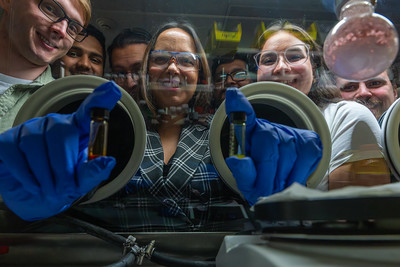Undergraduate Research
What is Undergraduate Research?
“A mentored investigation or creative inquiry conducted by undergraduates that seeks to make a scholarly or artistic contribution to knowledge.” - The Council on Undergraduate Research
Undergraduates can complete research under the mentorship of faculty, graduate students, or other staff members. Students may work on a specific portion of a faculty member’s research or could even conduct their own research under the guidance of a mentor.

Why Participate in Undergraduate Research?
- Explore Career Paths: Get hands-on experience completing research in your area of interest, helping you shape your next steps
- Develop Transferable Skills: Enhance your critical thinking, problem-solving, communication, collaboration, and independence – all of which are valuable in any career path whether it involves research or not
- Learn Research Skills: Gain a deep understanding of research design, methodology, techniques, and more
- Find Your Community: Research groups and labs create a sense of belonging, making a large campus feel more like home
- Build Mentoring Relationships: Work closely with mentors who guide your research, offer career advice, and provide recommendations
- Change Your Perspective: Learn to view challenges and failure as opportunities for
growth and innovation
Getting Started with Undergraduate Research
- Identify a subject that interests you: Reflect on classes you’ve enjoyed. Was there a project, paper, lab, idea, or experience that left you wanting to learn more? Why did you enjoy it? What do you want to explore further? Check out MSU Scholars to see what research is happening at MSU
- Use your Spartan Network: Talk to faculty members about their research, seek guidance from graduate student mentors, and check in with your academic advisor for connections and resources. MSU’s Undergraduate Research Office has resources from tips on preparing to talk with a faculty member to lists of research opportunities to peer advising appointments, and workshops.
- Demonstrate your Commitment and Initiative: You may apply for an existing position on Handshake or another site, or ask to join a faculty member’s research lab. Ensure you’re making a positive impression by preparing high quality application materials for positions, and reading some of a faculty members’ other research before meeting with them about an opportunity.
What do undergraduate researchers do?
Every research experience is different. Opportunities range from a few hours a week during the academic year to more intensive involvement over the summer. They might be paid or unpaid. The day-to-day work varies, but students are likely to complete or contribute to any of the following tasks/projects under the guidance of a faculty mentor or graduate student:
Engaging in discussions during lab meetings, where ongoing research, results, and future directions are discussed.
Maintaining and calibrating lab equipment, troubleshooting technical issues, and ensuring the lab adheres to safety protocols.
Using academic databases to find relevant articles and resources to support the research.
Gathering data through experiments, surveys, fieldwork, or other methods. This could include measuring samples, recording observations, or conducting interviews.
Conducting experiments according to established protocols, which may involve preparing materials, running tests, and recording results.
Entering collected data into databases, ensuring accuracy, and maintaining proper data organization.
Using statistical software or other tools to analyze data, identify trends, and draw conclusions.
Co-authoring research papers for publication, which involves writing, editing, and reviewing manuscripts.
Assisting in the development of new research proposals by formulating hypotheses and designing experiments.
Compiling findings into written reports, creating visualizations of data, and preparing presentations for lab meetings or conferences.
Researching and summarizing existing literature to understand the current state of knowledge in the field and identify gaps that the research project might address.
Funding in the College of Natural Science
Showcasing your Work
As an MSU undergraduate, you have exciting opportunities to present your research and creative projects. Professional organizations in your field of research host conferences and forums for research and MSU’s Office of Undergraduate Research hosts two opportunities annually.
The University Undergraduate Research and Arts Forum (UURAF) is held each spring and allows students to share their work with faculty, staff, peers, and external audiences. Participants gain experience presenting their research, answering questions, and receiving constructive feedback from judges, with the possibility of winning awards.
Additionally, Mid-SURE (Mid-Michigan Symposium for Undergraduate Research Experiences) is a hybrid event held in July, offering both in-person and virtual poster presentations. This event is open to current MSU students, recent graduates, incoming students who complete orientation, and visiting students from other institutions in Michigan. Mid-SURE provides a platform to share your research with the MSU community, gain valuable presentation experience, and network with peers and faculty.